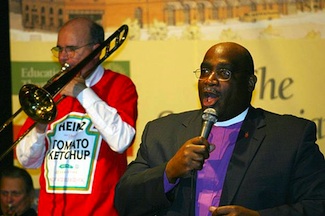LETTERS FROM THE GLOBAL PROVINCE
Striking the Right Note, Global Province Letter, 1 January 2014
On Too Long. Back when we actually paid attention to speechifiers, Will Rodgers, America’s all time, most lovable quipster and humorist, shared the dais with a politician the world has long since forgotten. The pol was up first and, boy oh boy, did he talk. The spew of words from his lips soared higher than any of the new gushers from oil wells in Will’s Oklahoma. Occasionally he’d pause to wipe beads of sweat off his forehead or to take an extra gulp of air, but then a new torrent of words would take wing, travelling all the faster because they were not weighed down with profundity or meaning. Finally, more than an hour and one half later, he closed.
Will stood up to have his say, “It’s an honor,” he said “to share the lectern with that renowned Chinese statesman On Too Long.” That said, Mr. Rodgers sat down.
Understanding the Moment. It’s a nifty trick for a leader or speechmaker or eminence to understand the mood of the times or figure out what will kindle an audience. These days hoof -and -mouth disease seems to be running rampant. This came to mind recently when we heard the marvelous Roger Daltry of the Who sing off-key and off mood at a recent Congressional ceremony honoring the receipt of a Winston Churchill statue in the Capitol. The apt word, apt song, right tone, right picture were absent. Things were awry. In discourse, in song, in action, in ceremony, things have gone flat. And people are not listening.
We hear that network TV audiences are falling, while newspapers and magazines are folding. A thousand reasons are given for such failures. “Young people don’t read.” “Cable is fragmenting audiences.” “We are so polarized that common messages don’t work.” “Economics favor more targetted media and cheaper approaches.” Etc.
Boutique Marketing. But we think as much that it stems from the end of the mass market. In eras gone by any trite message for the millions worked in newspapers and TV. No longer. Giant advertising campaigns that sing the praises of humdrum products and wax poetic about slipshod service have caused consumers to close their ears and seal their purses. In particular many recoil at the offerings of banks, telephone companies, and other service providers. We have previously commented on “Companies You Love to Hate:” The very nature of their rhetoric and packaging, as much as the value-deficient nature of their products, puts a gulf between them and their customers. They don’t even come close to hitting the right note. Their pitches fall on deaf ears, leading to humongous marketing costs and terrible customer turnover.
As we come to the end of the mass production and mass marketing world, audiences are looking for customization at every turn. That means that products increasingly will be sold in a custom, special way. Diageo, a conventional liquor behemoth, exemplifies the drift away from big budget advertising to communications that better communicate craft:
At first, Diageo's strategy with Bulleit was simple: Do nothing. The company wanted to gradually increase sales but retain the independent "frontier whiskey" vibe that meant drinkers thought they were discovering a niche bourbon, not a product from the world's biggest liquor maker.
After the Seagram acquisition, Mr. Bulleit, a 70-year-old native of Lexington, Ky., carried on as he had since 1987, when he revived a family bourbon recipe last used in the 1860s: He talked to bar managers, hosted tasting sessions and sold his whiskey almost one bottle at a time.
By restricting advertising spending and selling only to select bars, Diageo aimed to create an independent, hipster aura around Bulleit. The plan worked: Buoyed by the renaissance in bourbon and with a growing following in the cocktail trade, sales of Bulleit have increased fivefold in the past three years, largely through "on-trade" sales in bars.
The strategy is the antithesis of the $100 million marketing budgets given to Diageo's flagship brands, such as Smirnoff, Johnnie Walker and Guinness. But it forms part of the U.K. company's attempts to gain dominance in the rapidly expanding market for U.S.-made brown spirits. North American whiskey—mainly consisting of bourbon, Tennessee and Canadian whiskeys—accounted for 53% of the total growth in the $21 billion U.S. spirits market in the year ended Oct. 12, according to Nielsen.
Sophisticated makers of all sorts of upmarket goods are learning to sell through understatement using the grapevine, measured prose, and relatively few dollars to reach target audiences. The volume, the tone, and the character of the smart 21st century message lacks the blare and glare of conventional marketing. Now we are compelled to put more money into the product and use a leaner marketing approach that rings a little truer.
Cool Instead of Hot. Sophistication, then, uses cool chords rather than frenetics to strike up a relationship with the audience. Ishmael Reed, a poet, believes the president embodies the hip and the cool in his walk, his bearing, his attitude, and his persistence. "Like the president, cool musicians carried themselves with a regal bearing. Some members of the generation before them had to engage in minstrel-like antics to make a living. Cool musicians demanded respect, and when attacked didn’t blow up, but, like the president, responded stoically. One of his favorite words is persistence, the attitude of his hero, the saxophonist Sonny Rollins, the greatest surviving bebopper.” “Last month I got to see the president of the Cool at the San Francisco Jazz Center, a $64 million building that opened earlier this year. I am in my second term as its poet laureate, and one of my poems, When I Die I Will Go to Jazz, has been installed on one of the buildings walls (in an alley named after Hawes’s memoir, Raise Up Off Me), so I was invited to attend the event.” Obama, according to Reed, above all politicians, best exemplifies the spirit of cool we once heard radiating through the world of bebop.
Indeed, low-key messages that penetrate our deepest consciousness have a certain musical cadence of their own. In the movie Blow Up, Vanessa Redgrave is directed or orchestrate her movements in counter rhythm, cutting against the beat the music in the background might otherwise dictate. She goes her own way, putting poetry into her movement.
 Getting the Sound Right. Sound and cadence not only make bebop or poetry right. They also are essential to churches, and cities, and celebrations. It turns out Notre Dame Cathedral has been making the wrong sounds for years, and now church elders are spending a fortune to bring back the melodics of centuries past. It is replacing some bells with the hope of capturing “the harmony and harmonics of the bells that existed before 1789.” Here, indeed, is the sound the Reverend Patrick Jacquin, the rector of Notre Dame, hopes to restore. If something does not sound right, there is no hope of hitting the right note.
Getting the Sound Right. Sound and cadence not only make bebop or poetry right. They also are essential to churches, and cities, and celebrations. It turns out Notre Dame Cathedral has been making the wrong sounds for years, and now church elders are spending a fortune to bring back the melodics of centuries past. It is replacing some bells with the hope of capturing “the harmony and harmonics of the bells that existed before 1789.” Here, indeed, is the sound the Reverend Patrick Jacquin, the rector of Notre Dame, hopes to restore. If something does not sound right, there is no hope of hitting the right note.
Indeed, purists around us are ever working to achieve perfect pitch and better tuned instruments. For instance, Diana Deutsch has reported “we all have the potential to acquire perfect pitch.” Likewise technologists keep pushing the envelope with hopes of offering us ever more perfectly tuned pianos, guitars, and what not.
 The Bishop Scores. But all the physicists and psychologists and engineers in the world cannot achieve the pacing and humor and heartfelt meaning that goes into striking the right note if triviality clouds our brains and coats our sentences. We attended a pleasant but long winded commencement at Boston University in 2012. The talks were deadly, and all the ceremonies lasted some six hours. The most interesting event in the proceedings was the arrival of a swarm of bees which delayed events until the groundkeepers could get them to move on. But, at the last, at the end of the university-wide speeches, the cloud lifted. Bishop Peter D. Weaver, who now and again plays an instrument or two, did a perfect benediction which said everything that needed to be said:
The Bishop Scores. But all the physicists and psychologists and engineers in the world cannot achieve the pacing and humor and heartfelt meaning that goes into striking the right note if triviality clouds our brains and coats our sentences. We attended a pleasant but long winded commencement at Boston University in 2012. The talks were deadly, and all the ceremonies lasted some six hours. The most interesting event in the proceedings was the arrival of a swarm of bees which delayed events until the groundkeepers could get them to move on. But, at the last, at the end of the university-wide speeches, the cloud lifted. Bishop Peter D. Weaver, who now and again plays an instrument or two, did a perfect benediction which said everything that needed to be said:
So we come to the Benediction
on this day of rejoicing and mourning at Boston University.
If you were to GOOGLE the definition of Benediction,
it would tell you that Bene-diction means simply “good word”.
As you look back on your University journey, a good word is “Hallelujah”.
As you look around at friends, a good word is “caring”.
As you look at faculty and administration, a good word is “wow”.
As you look at family and parents, a good word is “love” – or maybe “relief”.
As you look to the future, a good word is “yes”.
As you look deep into your own heart, a good word is “faith”.
As you look into the eyes of those grieving, a good word is “Shalom”, “Salaam”, “Peace”.
As you look to go from this day and place, a good word is “Adios”, which means
“Go with God.”
Amen.
The Bishop having spoken, exeunt omnes smiling.
P.S. Reed has some sense of what it means to find the right note. “In 1998, Reed spoke about his influences in an interview: "I've probably been more influenced by poets than by novelists — the Harlem Renaissance poets, the Beat poets, the American surrealist Ted Joans. Poets have to be more attuned to originality, coming up with lines and associations the ordinary prose writer wouldn't think of."[11]” Striking the right note in 2013 demands this same originality.
P.P.S. To strike the right note in a world filled with mindless sound, we are pressed to strive for polyrhythm. “Polyrhythm is the simultaneous use of two or more conflicting rhythms, that are not readily perceived as deriving from one another, or as simple manifestations of the same meter.[2] The rhythmic conflict may be the basis of an entire piece of music (cross-rhythm), or a momentary disruption. Polyrhythms can be distinguished from irrational rhythms, which can occur within the context of a single part; polyrhythms require at least two rhythms to be played concurrently, one of which is typically an irrational rhythm.[3]”
Home - About This Site - Contact Us
Copyright 2014 GlobalProvince.com